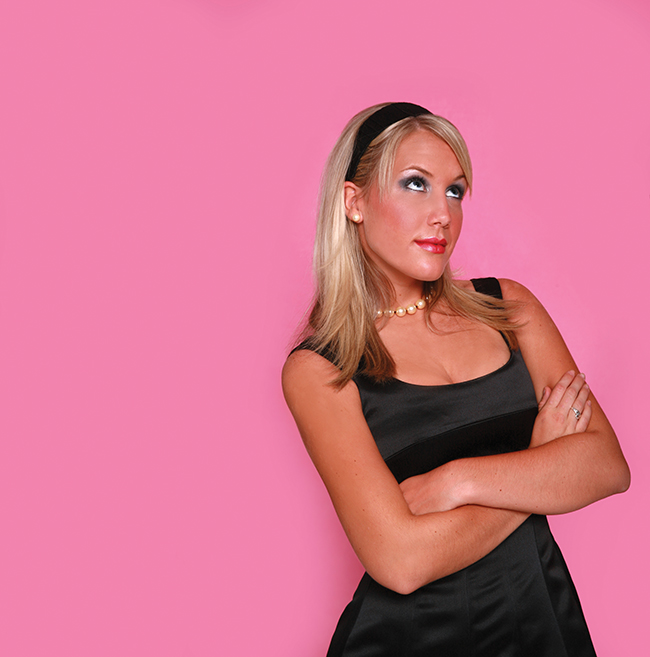Ali Walsh looks at how to combat those all-too-common misperceptions about those of us with coeliac disease…

Prior to being diagnosed coeliac, I ate everything on my plate, whether I liked it or not. I was the easiest person to cater for and didn’t really think too much about it. Then coeliac disease descended and I suddenly found myself in a whole new world. Who knew eating could be such a minefield? And if my own problems of finding out what I could and couldn’t eat or drink weren’t bad enough, they were made 10 times worse by the effect my new diet had on other people.
You’d think it would be no-one else’s business, right? But life is a lot more complicated than that. Unless we hole ourselves away and decide to be social recluses, awkward situations will come our way. It might be a monthly work lunch, dinner at a friend’s or a grand wedding breakfast. Each time you’ll have to be clear about your diet and there may be someone who just doesn’t understand. But don’t panic! Below is a handy guide to make things a little easier.
The 7 Types of People To Fear (and what you can do about them)
The Know-It-Alls
It’ll probably be a chap who’s never had a sick day from work – he doesn’t believe in being ill. To these people, illness is a sign of weakness, and your diet will be no different.
Most likely to say: “She hasn’t got anything wrong with her.”
The first time I encountered someone like this I stared at them open-mouthed. At that time, I hadn’t been formerly diagnosed and I was still reeling from frequent stomach cramps.
How to handle it: Whatever you do, don’t eat anything they hand you unless it’s in a sealed packet and you can read the ingredients for yourself; it would be easy for them to think (falsely) if you don’t know there’s gluten in the food, it won’t affect you. Then remind them they’re not a qualified dietitian or medically trained professional, that your illness is very real, and if they give you so much as a crumb of gluten they’ll make you seriously sick.

The Downright Rude Idiot
If you thought the Know-It-All was bad, the Downright Rude Idiot really takes the gluten-free biscuit. You’ll probably be down the pub celebrating someone’s engagement and the DR Idiot insists the focus shouldn’t be on your ‘faddy’ diet.
Most likely to say: “Just shut up and eat.”
Probed further, they’ll tell you that this sort of thing didn’t happen 20 years ago and your fussiness is time-consuming and expensive.
How to handle it: Regardless of this shocking behaviour, be the bigger person by remaining calm. You can tell them that actually this sort of thing not only happened 20 years ago but nearly 2000 years ago, as proved by a Greek named Aretaeus of Cappadocia who wrote about the ‘Coeliac Affection’. Furthermore, researchers recently found a 2,000-year-old corpse in Italy showing signs of coeliac disease who did shut up and eat gluten and then died from malnutrition (probably).

The Silent Bully
No-one’s actually said anything to you, but the office lunch table makes your stomach lurch with disappointment. You’ll be presented with a familiar beige buffet comprising of sausage rolls, sandwiches, biscuits and cheap cupcakes. None of them will be gluten-free and when you point this out, someone will cheerily walk you over to a slab of cheese that’s sitting next to a cracker.
Most likely to say: “You can eat grapes, can’t you?”
How to handle it: Obviously you can bring your own food, but it’s not the best way to feel included. If you can, speak to the catering manager or the chef in advance and ask if it’s possible whether they can provide you with something free-from cross-contamination. And if your boss goes to great lengths to get you something you can have, make sure you thank them and sing their praises loudly to the office gossip.

She Means Well (But Always Gets It Wrong)
For me, this person leads to the worst kind of food scenario – the one where you realise they’ve gone to immense trouble, time and money only to botch it and get you something that’s wheat-free but not gluten-free.
Most likely to say: “Now I spoke to the young man in the supermarket and he confirmed all of these rye breads and crackers are okay for you.”
How to handle it: Don’t be tempted to keep quiet and not acknowledge her error. She’ll only keep buying you the wrong foods at every occasion you see her. The best way to deal with things is to thank her for going to so much trouble and then break it to her gently that you can’t actually have the food. Although it’s obviously not your fault, if you feel bad for her you could offer to go back to the supermarket and swap it for something you can have.

Misplaced Empathy
This is a controversial one: the person who also has a special diet, but it’s out of choice rather than medical necessity, and you really wish you could make the decision not to be coeliac.
Most likely to say: “I have the same problem being vegan.”
How to handle it: It really comes down to whether you like this person and/or need to be civil to them. Either way, it won’t pay to be rude or to clench your fists, seething with anger at their supposed audacity. Some people may feel they don’t have a choice (especially if their diet is due to religious reasons). Others may not know about the effects of cross-contamination. It may be appropriate to educate them – e.g. “Do you get sickness & diarrhoea from eating something you shouldn’t?” Alternatively, you may wish to get together and see if you can persuade your mutual friend/boss/family to cater for special diets, especially as free-from items increasingly seem to be vegan, too.

The Hostess With The Mostess Inexperience
She’s made something specially for you, but didn’t know about stock cubes (and she’s used one with wheat) so you’ve ended up with boiled potatoes and salad. She wasn’t sure how to make a gluten-free version of her signature tarte tatin so she’s given you a melon fan instead, which she also served you as a starter.
Most likely to say (jauntily): “Everything’s all right, isn’t it?”
How to handle it: Invite her round to your house and bake everything you can think of that’s naturally gluten-free. Amaze her with a delicious array of desserts such as lemon posset, pavlova, crème brulee or chocolate torte. Watch her scribbling ideas down on her napkin as another mouth-watering dish is served. She’ll probably thank you for making her realise there’s so much you can eat. It won’t be long before you’ll be invited back to a gluten-free feast at her house.

The Stress-Head
They shouldn’t have a difficult life, but somehow everything is a drama. You’ve not made it hard for them and yet they’ll be flustering about everything, including the lunch they invited you to stay for (despite cautionary advice about your diet).
Most likely to say (huffily): “And now we have to find something you can eat.”
How to handle it: You’ve got enough to deal with in your life without someone making you feel like a leper. My advice? Unless they’re family, make your excuses and leave quickly, making a mental note to delete them from your phone.
If all else fails and the person you’re talking to truly doesn’t understand how coeliac disease is real and hugely affects your life, I’m a big fan of the following comeback line: “I could agree with you, but then we’d both be wrong.” Then walk away (smiling).
 Ali Walsh was diagnosed with coeliac disease nearly 20 years ago, at a time when free-from food was scarce. She started her own cake business because there was a lack of fresh gluten-free cake on offer. Ali feels if you can’t eat a particular food, you shouldn’t feel deprived, and has created recipes so delectable that even people without dietary requirements clamour for her bakes. A regular on BBC radio, Ali often advises on managing diets. www.thelocalbakehouse.com.
Ali Walsh was diagnosed with coeliac disease nearly 20 years ago, at a time when free-from food was scarce. She started her own cake business because there was a lack of fresh gluten-free cake on offer. Ali feels if you can’t eat a particular food, you shouldn’t feel deprived, and has created recipes so delectable that even people without dietary requirements clamour for her bakes. A regular on BBC radio, Ali often advises on managing diets. www.thelocalbakehouse.com.
